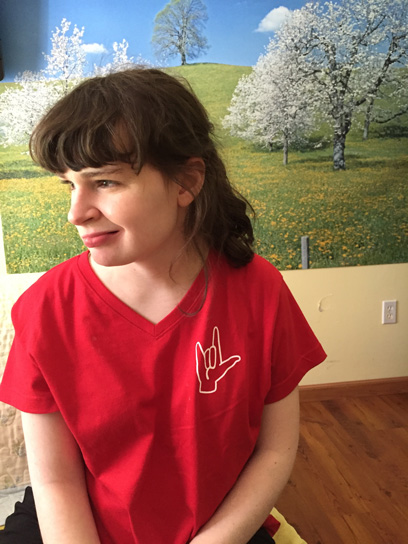Virginia Project for Children and Young Adults with Deaf-Blindness (VDBP)
Jump to: Who We Are | What We Do | About Deaf-Blindness | Census | Professional Development Training Program | Resource Lending Library | Contact Us
Who We Are

The Virginia Project for Children and Young Adults with Deaf-Blindness is a statewide program designed to provide technical assistance, training, distance education, and networking information to families, teachers, and service providers of individuals birth through 21 who have both a hearing loss and a vision loss.
The Virginia Deaf-Blind Project is committed to supporting families, teachers, and service providers in their endeavors to improve outcomes for children and youth who experience both vision and hearing loss. Through providing technical assistance, training, and information, we aspire to improve the quality of life for people who are deaf-blind as they live in their homes, learn in their schools, socialize in their communities, and access the services they choose.
The Virginia Project for Children and Young Adults with Deaf-Blindness is federally funded under the individuals with Disabilities Education Act (IDEA, Part D) to provide informative and consultative services to families and service providers. The project is part of the Partnership for People with Disabilities, a University Center for Excellence in Developmental Disabilities (UCEDD) at Virginia Commonwealth University (VCU).
Return to top
What We Do
Upon request, we can provide training and consultation (also referred to as technical assistance or TA) to families, service providers, teachers, and administrators of children and youth who are deaf-blind via telephone, on-line, or face to face contact.
Return to top
About Deaf-Blindness
Deaf-Blindness is a complex term. It is often mistakenly thought to apply only to those who do not see or hear anything. In fact, of those on the Deaf-Blind Child Count, ~ 80% have some vision and ~ 80% have some hearing (National Center on Deaf-Blindness, 2019).
The combined effect of hearing and vision loss can dramatically impact how someone accesses information and communication. It is critically important to ensure that children and young adults with Deaf-Blindness have access to their home, school, and community environments to give them the opportunity to learn and communicate.
Return to top
Census
Each year in December, state projects serving children who are deaf-blind report on children identified in their state. The count serves as the common vehicle to meet federal grant requirements for both the state/multi-state and national technical assistance projects. It also serves as a common data collection and reporting mechanism for use across the country. This group serves as the nexus for state project activities related to the child count, its purpose, focus and discussions.
For more information on the National Child Count, please visit the National Center on Deaf-Blindness
Return to top
The VA Deaf-Blind Project has a Resource Lending Library that families and professional can borrow. Materials including resource books, curricula, modules, journals, videotapes, CDs and DVDs are available for families and educational staff to utilize as they work to achieve success for children who are Deaf-Blind. Materials are loaned for a one month period. Contact Valerie Luther (valuther@vcu.edu) to discuss your resource needs.
Return to top
Contact Us
The Virginia Project for Children & Young Adults with Deaf-Blindness
Partnership for People with Disabilities
700 E Franklin Street
Suite 140
Richmond, VA 23219
Dr. Julie Durando, Ed.D
Project Director
jdurando@vcu.edu
(804)-828-8252
Ira Padhye, M.Ed
Project Coordinator
iapadhye@vcu.edu
(804)-828-2052
Hilary Hodes, M.Ed
Technical Assistance Specialist
hhodes@vcu.edu
(804)-827-9972
Valerie Luther
Consumer Outreach Specialist
valuther@vcu.edu
(804)-827-0195
CapTel: (804)-628-0413
Dawn Snow
Family Engagement Specialist
peiferdm@vcu.edu
Return to top